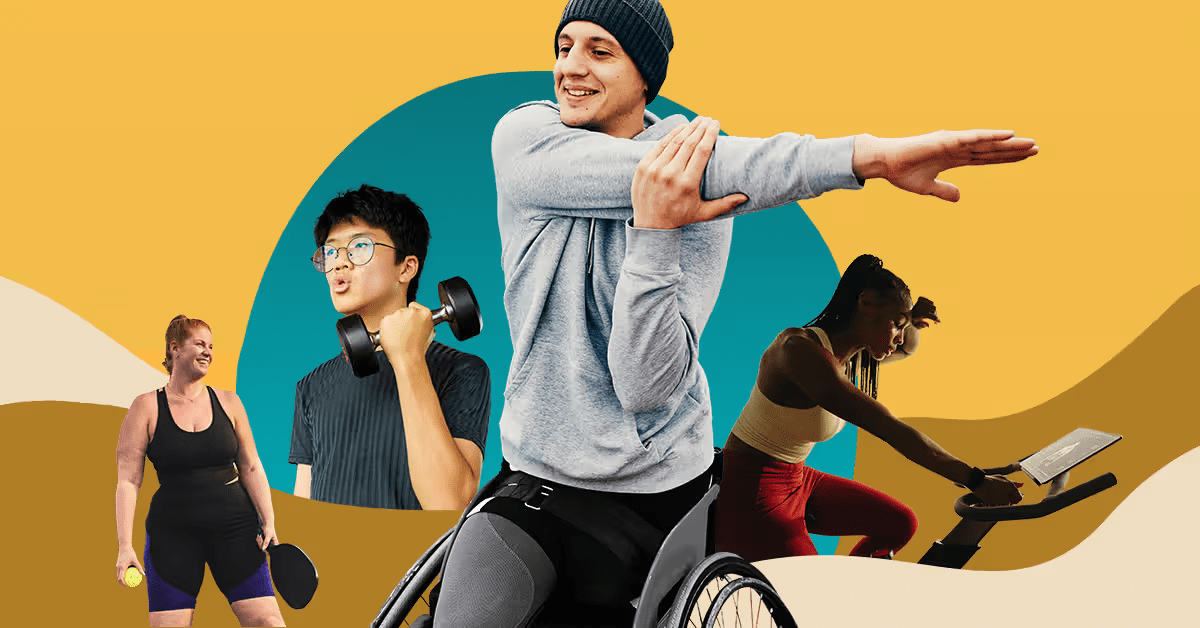Welcome to the realm of fitness, where the pursuit of a healthier, stronger you begins. In this comprehensive guide, we will embark on a journey that goes beyond the conventional notions of exercise and diet.
Our goal is to equip you with the knowledge and tools to cultivate a sustainable and fulfilling fitness routine that aligns with your unique lifestyle and aspirations.
Fitness is not merely the absence of illness but the presence of vitality and strength. It encompasses a holistic approach to well-being, incorporating physical, mental, and emotional aspects.
The Three Pillars of Fitness
1. Physical Fitness:
1. Cardiovascular Health: Engage in activities that elevate your heart rate, such as brisk walking, running, or cycling.
2. Strength Training: Incorporate resistance exercises like weightlifting or bodyweight workouts to build muscle and enhance metabolism.
3. Flexibility: Stretching exercises improve joint mobility and reduce the risk of injuries.
2. Mental Fitness:
1. Mindfulness and Meditation: Practice mindfulness techniques to reduce stress and enhance mental clarity.
2. Cognitive Exercises: Challenge your brain with puzzles, games, or learning new skills.
3. Emotional Fitness:
1. Social Connection: Build a supportive network of friends or join fitness classes to foster emotional well-being.
2. Emotional Intelligence: Develop self-awareness and coping mechanisms to manage stress effectively.
Designing Your Fitness Plan
1. Setting Realistic Goals: Establish clear, achievable objectives to guide your fitness journey. For example, aiming to walk 10,000 steps a day or completing a 5K run within a specific timeframe.
2. Tailoring Your Routine: Consider your preferences, schedule, and health status when crafting your fitness routine. If you enjoy dancing, incorporate dance workouts into your regimen. If time is limited, opt for high-intensity interval training (HIIT) for efficient and effective workouts.
Nutrition and Hydration
1. Fueling Your Body: Understanding the importance of a balanced diet is crucial. Consume a variety of nutrient-dense foods, including lean proteins, whole grains, fruits, and vegetables. Consider consulting a nutritionist for personalized guidance.
2. Hydration: Water is the elixir of life. Ensure you stay adequately hydrated throughout the day, especially during and after workouts. Proper hydration supports optimal bodily functions and aids in recovery.
Overcoming Challenges
1. Consistency is Key: Building a fitness routine is a marathon, not a sprint. Consistency is paramount. Find activities you enjoy to make fitness a sustainable part of your lifestyle.
2. Overcoming Plateaus: Stagnation is a natural part of any fitness journey. Switch up your routine, set new challenges, or seek guidance from fitness professionals to overcome plateaus and keep progressing.
Rest and Recovery
1. The Importance of Rest: Amidst the zeal for progress, it’s crucial to recognize the significance of rest and recovery. Adequate sleep, usually between 7-9 hours for adults, allows your body to repair tissues, consolidate memories, and regulate mood. Incorporate rest days into your weekly routine to prevent burnout and reduce the risk of overtraining.
2. Active Recovery: On rest days, consider incorporating low-intensity activities such as yoga, swimming, or gentle stretching. Active recovery promotes blood circulation, enhances flexibility, and aids in the recovery process without placing excessive strain on your body.
Monitoring Progress
1. Tracking Your Journey: Regularly assess your progress to stay motivated and make informed adjustments to your fitness plan. Keep a fitness journal, use apps, or take periodic measurements to track changes in strength, endurance, and overall well-being.
2. Celebrating Achievements: Acknowledge and celebrate your accomplishments, whether it’s reaching a fitness milestone, overcoming a personal challenge, or consistently following your routine. Positive reinforcement contributes to sustained motivation.
Seeking Professional Guidance
1. Consulting Fitness Professionals: Consider consulting with fitness experts, such as personal trainers, nutritionists, or physical therapists. Their expertise can provide tailored advice, correct form, and guidance, ensuring your fitness journey is safe, effective, and enjoyable.
2. Community Support: Engaging with like-minded individuals can provide encouragement and accountability. Join fitness classes, online communities, or local groups to share experiences, tips, and challenges, fostering a sense of camaraderie on your fitness journey.
Embracing a Holistic Approach
1. Stress Management: Integrate stress-reducing practices into your routine, such as deep breathing exercises, progressive muscle relaxation, or spending time in nature. Chronic stress can negatively impact your overall health, making stress management an integral part of your holistic fitness journey.
2. Balancing Work and Leisure: Maintain a balance between your work, fitness routine, and leisure activities. Allowing time for relaxation and pursuing hobbies not only contributes to your mental well-being but also prevents burnout.
Adapting to Life Changes
1. Flexibility in Your Routine: Life is dynamic, and so should be your fitness routine. Embrace adaptability, whether it’s adjusting your workout schedule to accommodate a busy week or modifying exercises to suit changing circumstances.
2. Pivoting During Challenges: Life’s challenges are inevitable, but your response is within your control. If facing setbacks such as injuries or time constraints, consult with healthcare professionals or fitness experts to modify your routine and navigate challenges effectively.
Read Also Health Benefits of Yoga
Inspiring Others

1. Leading by Example: As you experience the positive changes in your life through fitness, inspire others around you. Share your journey, offer support, and be a beacon of encouragement for those who may be seeking guidance on their own path to wellness.
2. Community Engagement: Consider participating in community fitness events, charity walks, or wellness initiatives. Contributing to a collective effort fosters a sense of purpose and community, amplifying the positive impact of fitness beyond individual well-being.
Long-Term Health Benefits
1. Cardiovascular Health: Engaging in regular cardiovascular exercises, such as brisk walking, jogging, or swimming, contributes to a healthy heart. Over time, these activities can lower blood pressure, improve cholesterol levels, and enhance overall cardiovascular function, reducing the risk of heart disease.
2. Bone Density and Joint Health: Weight-bearing exercises, including strength training and resistance exercises, are essential for maintaining bone density and joint health. These activities help prevent osteoporosis and reduce the risk of joint-related issues, ensuring your body remains strong and resilient.
Age-Related Considerations
1. Fitness Across the Lifespan: Fitness is a lifelong pursuit, and its benefits extend across all age groups. For children and adolescents, it promotes healthy growth and development, while in older adults, it helps maintain mobility, independence, and cognitive function.
2. Adaptations for Different Life Stages: Recognize that fitness needs evolve with age. Tailor your exercise routine to accommodate changing circumstances, incorporating activities that address specific age-related considerations, such as balance exercises for older adults or family-friendly workouts for parents.
Sustainable Nutrition Practices
1. Building Healthy Habits: Incorporate sustainable nutrition practices into your daily life. Focus on mindful eating, choose whole and minimally processed foods, and savor each meal. These habits contribute not only to physical health but also to a positive relationship with food.
2. Hydration for Optimal Performance: Optimal hydration is crucial for peak physical performance. Adjust your water intake based on activity levels, climate, and individual needs. Proper hydration supports energy levels, cognitive function, and overall well-being.
Future Trends and Innovations
1. Technological Advances in Fitness: Stay abreast of emerging technologies that enhance the fitness experience. From wearable devices tracking performance metrics to virtual fitness classes and AI-powered personalized workout plans, innovations continue to enrich the landscape of fitness.
2. Integrating Mind-Body Practices: Mind-body practices, such as yoga and meditation, are gaining prominence for their holistic benefits. Consider incorporating these practices into your routine to enhance mental well-being, reduce stress, and foster a deeper mind-body connection.
Cultivating a Mindset for Success
1. The Power of Positive Thinking: Your mindset plays a pivotal role in your fitness journey. Cultivate a positive mindset by focusing on your strengths, celebrating achievements, and viewing challenges as opportunities for growth. A positive outlook not only enhances your motivation but also contributes to overall mental well-being.
2. Embracing a Growth Mindset: Adopt a growth mindset that sees setbacks as temporary and views learning and improvement as continuous processes. Embrace challenges as opportunities to develop resilience and refine your approach to fitness.
Fitness for Mental Health
1. Stress Reduction and Mental Clarity: Regular exercise has profound effects on mental health. Physical activity releases endorphins, reducing stress and promoting a sense of well-being. Incorporate activities like jogging, cycling, or dancing to elevate your mood and enhance mental clarity.
2. Mindful Movement Practices: Explore mindful movement practices, such as tai chi or qigong, which combine physical activity with mental focus. These practices not only contribute to physical fitness but also promote relaxation and mindfulness, fostering a harmonious connection between body and mind.
Environmental Considerations
1. Outdoor Fitness and Nature Connection: Take advantage of outdoor fitness opportunities to connect with nature. Activities like hiking, trail running, or outdoor yoga provide a refreshing change of scenery and offer additional benefits, including improved mood and reduced stress.
2. Sustainable Fitness Practices: Consider the environmental impact of your fitness routine. Opt for eco-friendly workout gear, support sustainable fitness facilities, and explore activities that have a lower carbon footprint. Aligning your fitness journey with sustainable practices contributes to the well-being of both yourself and the planet.
Inspiring Lifestyle Habits
1. Integrating Movement into Daily Life: In addition to structured workouts, find opportunities to incorporate movement into your daily routine. Take the stairs, go for short walks during breaks, or engage in quick stretching sessions. These habits contribute to overall physical activity levels and support a more active lifestyle.
2. Balancing Screen Time: With the prevalence of technology, balance your fitness routine with mindful screen time management. While technology can enhance your fitness experience, ensure you also allocate time for face-to-face social interactions, outdoor activities, and other screen-free pursuits.
Personalizing Your Fitness Journey
1. Tailoring Your Approach: Acknowledge and honor your individuality by tailoring your fitness routine to suit your preferences, interests, and unique circumstances. Whether it’s exploring a new sport, joining a dance class, or practicing a specific form of martial arts, personalization enhances enjoyment and sustainability.
2. Periodization for Long-Term Success: Incorporate periodization into your fitness plan, dividing it into distinct phases with varying intensity and focus. This strategic approach helps prevent burnout, reduces the risk of overtraining, and promotes continual improvement over the long term.
Cultivating Resilience
1. Embracing Setbacks as Learning Opportunities: Setbacks are inevitable, but viewing them as learning opportunities rather than failures is key to resilience. Analyze challenges objectively, adjust your approach, and use setbacks as stepping stones toward personal growth and improved performance.
2. The Role of Patience: Patience is a virtue in the realm of fitness. Understand that progress takes time, and sustainable results are achieved through consistent effort. Trust the process, stay committed, and appreciate the gradual transformations taking place.
In conclusion , as you navigate the ever-evolving landscape of fitness, remember that your journey is a dynamic and deeply personal experience.
By embracing a positive mindset, prioritizing mental health, considering environmental impacts, and integrating fitness into your lifestyle, you are not just building a stronger body but cultivating a richer, more fulfilling life.
May your ongoing commitment to health and well-being be a source of inspiration for yourself and those around you. Here’s to a future filled with vitality, balance, and the continuous pursuit of your best self. Cheers to the remarkable journey ahead!
